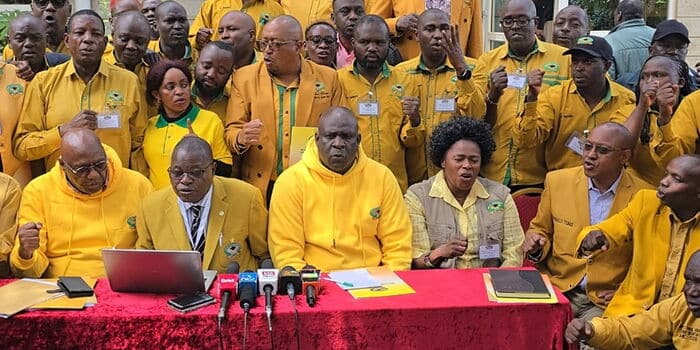
This is after the Registrar of Trade Unions declined to approve the proposed changes, citing numerous objections raised by members on both procedural and substantive grounds.
In a letter dated January 8, acting Registrar Ann Kanake particularly cited Article 13.0(a) (vii) of the constitution, which she said is against Section 34(2)(a) of the Labour Relations Act.
"As much as the Registrar acknowledges the presented application for amendment of the Union's Constitution, it is trite for Registrar to also consider other attendant issues," the letter reads.
The letter has been addressed to the union's National Secretary General.
"The objections and issues so far raised are too numerous for the Registrar to ignore."
Kanake has, however, instructed the proponents to address the objections raised by the members and respond accordingly to facilitate further consideration of the amendments.
At the heart of the push is the proposal to expand elective positions from 10 to 16, aimed at allowing officials from marginalised regions such as Coast, North Eastern, and Nairobi to secure national leadership roles.
Those behind it are pushing for the adoption of the Proportional Representation (Pro Rata) in the appointment of union delegates.
The union's constitution was enacted in 2010, when the union had only 20,000 members and currently has more than 120, 000.
The far-reaching changes also seek to remove the age limit for national office holders.
The current retirement age was raised from 60 to 65 years something that has been contested by a section of branch officials from across the country.
Union's Assistant National Treasurer Ronald Tonui commended the members and officials for their unwavering commitment to upholding the integrity of the union.
He said the decision to reject the proposed amendments serves as a powerful reminder that impunity and undemocratic practices cannot be tolerated, especially within an organization of highly educated professionals.
"The proposed changes were not subjected to the required member consultations as mandated by both the union and national constitutions, which is a critical flaw," he said.
He alleged that the efforts made to amend the union's constitution through questionable means will not be accepted.
He said "As we move forward, I urge the proponents to take a more inclusive and democratic approach to the process of constitutional amendments."
This, he noted, should involve soliciting feedback from all members, ensuring broad discussions in branch general assemblies, and passing the amendments through proper channels before presenting them at the Annual Delegates Conference.











